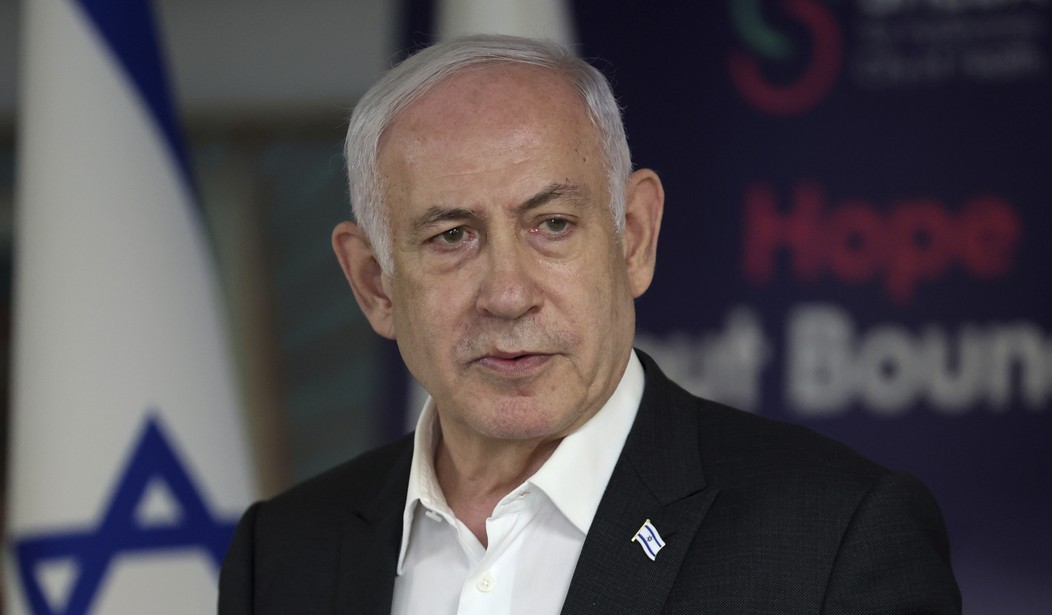Israel's success in the war that Iran launched through its proxies has produced progress on multiple fronts, as we shall see shortly. Some of this already has been made plain, of course. The IDF has not just destroyed Hamas' military-terror infrastructure, it has decimated (and worse) Hezbollah's command structure and logistics, and that led directly to the fall of Bashar al-Assad and the collapse of Tehran's "Shiite Crescent" directly resulted.
The main issue for the Israeli electorate remains the hostages, however, and their desire to get as many back alive as possible. Hamas recently stoked public pressure again by releasing alleged proofs of life to the families. Benjamin Netanyahu addressed the Knesset today to urge Israelis to stay the course, arguing that hostage negotiations have progressed because of the war rather than in spite of it:
“I would like to tell you carefully,” he says during a so-called 40 signatures debate which the opposition can call once a month, “there is some progress and there are three reasons for this particular progress. First, [Hamas leader Yahya] Sinwar is no longer with us; Hamas hoped that Hezbollah and Iran would come to their aid but they are licking their wounds; and Hamas itself is also taking more and more blows. So there is progress. I don’t know how long it will take, but we are making efforts.”
Days before the Hanukkah holiday, Netanyahu says happiness cannot be complete “until we get all the hostages home.”
“I cannot tell you all the things we are doing, but we are taking significant actions on all levels,” continues Netanyahu.
“We will continue to act in every way, without respite, until we bring everyone home from enemy territory,” he promises.
Is that the case? Since the collapse of Assad and the cease-fire with Hezbollah, Hamas has apparently bowed to reality in some small degree. According to reports from negotiations, they are no longer insisting on an IDF full withdrawal from Gaza as a precondition to a deal. Other sources reported yesterday that ninety percent of the gap has closed between the two combatants on an operational pause-hostage deal, but it's the remaining ten percent that is likely going to scuttle a deal without more pressure on Hamas to make concessions:
Hostage deal and ceasefire negotiations are 90% complete, a Palestinian official participating in the talks told the BBC on Sunday.
The official reportedly added that some significant issues remained to be resolved, among which was the presence of Israeli troops in the Philadelphi Corridor, a corridor in southern Gaza that runs parallel to its border with Egypt.
Last week, Hamas sources told the Hezbollah-affiliated Lebanese news outlet Al-Akhbar Israel’s demands that Hamas provide it with "a list of the names of all living and deceased prisoners" and that IDF soldiers held hostage in Gaza be included “in lists of prisoners who meet the criteria for the humanitarian phase," were the two main obstacles remaining in the hostage deal/ceasefire negotiations.
Given that Hamas gets resupplied through the Philadelphi Corridor and Israel had to defy its own benighted allies in seizing it, that's no small issue on the table. It's existential in both directions. Israel will not give up that control while Hamas remains organized in any sense in Gaza, not even to get all of the hostages back. Hamas' refusal to supply the names of hostages for release while simultaneously committing psychological torture of hostage families doesn't bode too well for the credibility of good faith by Hamas in negotiations, either.
But still, the war has changed the entire environment for Hamas, and they do appear to recognize their isolation now. Not only has Hezbollah negotiated for a separate peace in betrayal of the "unified battlefield" doctrine among Iranian proxies, they have apparently ceded control of southern Lebanon to the government too, or at least want to make it look like they have complied with UN Security Council Resolution 1701:
Lebanese caretaker Prime Minister Najib Mikati visited southern Lebanon this week, reflecting an attempt by the state of Lebanon to show that it will adhere to the conditions of the ceasefire signed last month, which put a stop to Israel-Hezbollah fighting.
Mikati visited several areas in southern Lebanon, including Marjayoun. “We look forward to long-term stability in the south through the army carrying out its duties in full cooperation with UNIFIL.
Our priority is the full implementation of international resolution 1701, Israel’s withdrawal from the lands it has penetrated, and the cessation of the systematic destruction of villages and its violations,” Mikati said.
That's not the only signal that Iranian proxy armies have had enough of a war in which Israel fights fully. Iran-backed militias in Iraq have also decided to back off after the fall of Assad largely cut off their access, a potential sign that the new Syrian regime is serious about ending the tradition of Iran treating them as a doormat:
A report this week indicates that some of these groups have scaled back the attacks following the Israel-Lebanon ceasefire signed on November 27, which ended Hezbollah’s attacks on Israel. An Al-Akhbar report on Monday – from an outlet generally seen as pro-Hezbollah – indicated that some of the Iraqi groups agreed to cease attacks.
Harakat Hezbollah al-Nujaba, a radical Shi’ite group based mostly in Iraq, though formerly in Ba’athist Syria, said that it agreed with Iraqi Prime Minister Shia al-Sudani to stop its offensive operations against Israel.
The spokesman for one of the groups, the Sayyed al-Shuhada Brigades, addressed this as well: Kazem al-Fartousi was quoted in the same report as saying that “circumstances determine the positions of the factions, and the principle of unity of arenas is not linked to a temporary alliance between the factions of the axis of resistance, but rather it is a matter of principle and doctrine, and whatever the losses, the Iraqi factions have not and will not abandon the principle of unity of arenas.”
This is pure spin. If they wanted to enforce the "unity of arenas" doctrine -- an alternate slogan for "unified battlefield" -- they'd step up the fight while Hamas still fights in Gaza. Hezbollah's retreat makes that impossible, both politically and militarily. The fall of Assad and especially the destruction of his military infrastructure by Israel has exposed these to certain destruction if they continue to attack, and they value their survival more than they value martyrdom for the lunatics of Hamas that started the war that completely undermined their 45-year project against Israel.
Will this get the hostages back sooner? It certainly can't hurt that Hamas has lost most of its leverage. But more to the point, Netanyahu has made Israel safer than it has been in decades and has transformed the region in the process.








